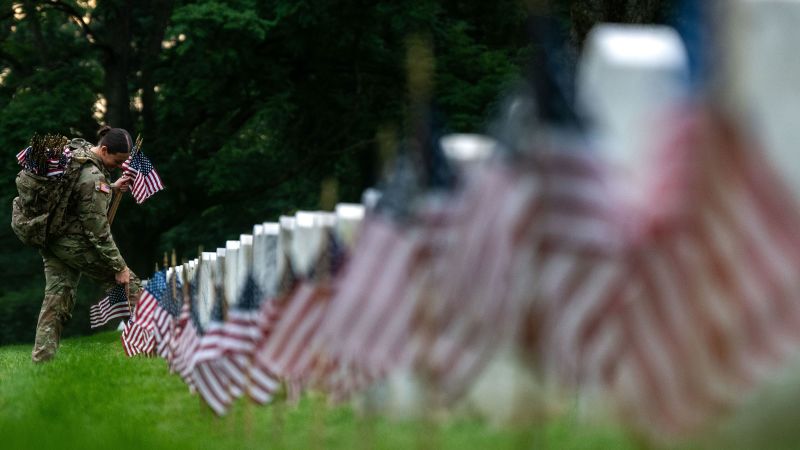CNN
—
It may be no surprise that President Donald Trump, who did not serve in the active-duty military, would rather celebrate victory than veterans.
In multiple social media posts this month, Trump said he would declare November 11 as Victory Day for World War I. He didn’t mention that it’s already a federal holiday: Veterans Day.
In a similar vein, Trump wants a military parade that could cost tens of millions of dollars to celebrate the US Army’s 250th birthday, which so happens to fall on his birthday, June 14. It’s also Flag Day, when the Continental Congress adopted the American flag.
“I view it for Flag Day, not necessarily my birthday,” Trump told NBC News in a recent interview. “Somebody put it together.”
It could be the same kind of coincidence by which the expensive new fighter jet the Pentagon is developing will be the F-47 and Trump is the 47th president.
Nobody at the White House appears to have put together that the day Trump wants to celebrate Victory in World War II Day, May 8, when Germany surrendered in Europe, was not the end of World War II. Americans continued fighting and dying in the Pacific theater until August, when the US dropped nuclear bombs on Hiroshima and Nagasaki in Japan.
Trump said it’s important for the US to celebrate these days. It sounds quite similar to Victory Day in Russia, a cringe-worthy idea for anyone who does not want to put the US government alongside Russia’s. But on the other hand, the president is not calling for full-on federal holidays. There are too many already, he said. (It would also take an act of Congress.)
The rhetorical idea of superimposing a celebration of victory over veterans is noteworthy.
It’s quite the evolution for a holiday that used to commemorate armistice when it was first observed by Woodrow Wilson in 1919, a year after the truce that ended the war:
“To us in America, the reflections of Armistice Day will be filled with solemn pride in the heroism of those who died in the country’s service and with gratitude for the victory, both because of the thing from which it has freed us and because of the opportunity it has given America to show her sympathy with peace and justice in the councils of the nations.”
A few years later, in 1923, just before his death, a frail Wilson would chastise Americans in an Armistice Day radio address for turning toward isolationism and not joining the League of Nations, a sentiment still relevant today as Trump disrupts the post-World War II economic and diplomatic order.
The president most associated with that post-World War II order, Dwight Eisenhower, is also the one who proclaimed that Armistice Day should become Veterans Day.
“Let us solemnly remember the sacrifices of all those who fought so valiantly, on the seas, in the air, and on foreign shores, to preserve our heritage of freedom, and let us reconsecrate ourselves to the task of promoting an enduring peace so that their efforts shall not have been in vain,” Eisenhower wrote.
He may be better remembered for a farewell speech warning of a military-industrial complex, which also echoes across history now that Trump, unlike Eisenhower, wants to parade military hardware through the nation’s capital.
“We have the greatest missiles in the world,” Trump told NBC News. “We have the greatest submarines in the world. We have the greatest army tanks in the world. We have the greatest weapons in the world. And we’re going to celebrate it.”

